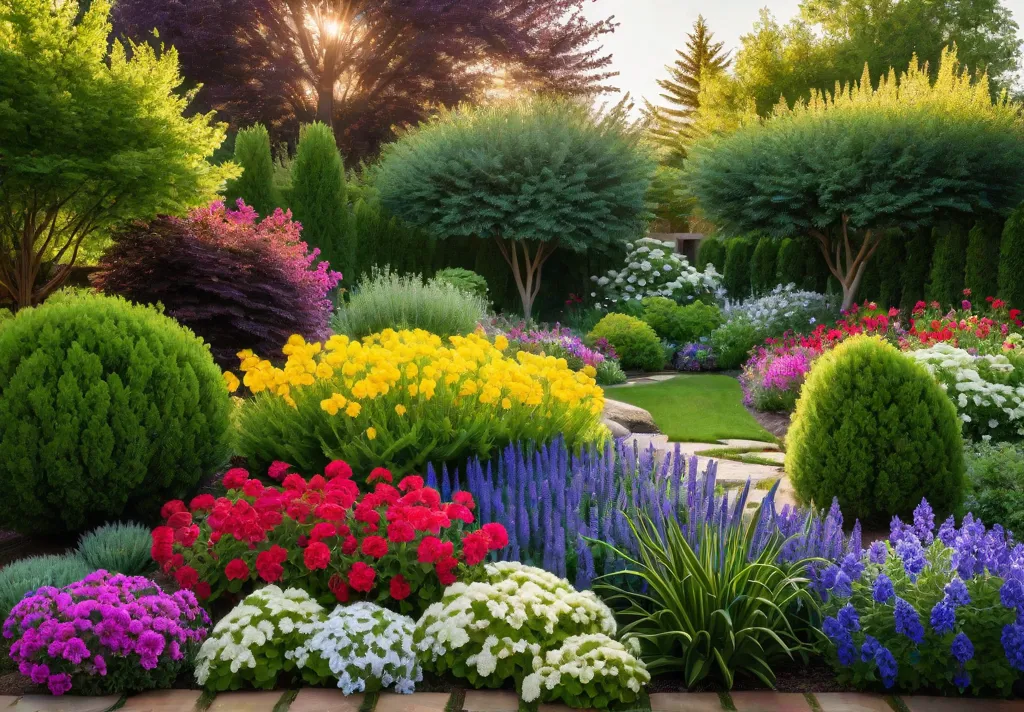Imagine stepping into a backyard oasis where every corner bursts with vibrant blooms, each petal a masterpiece of nature’s artistry. Whether you’re a seasoned green thumb or a budding gardener, the world of flowers holds endless possibilities for transforming your outdoor space into a breathtaking sanctuary.
Join me on a journey through the captivating realm of annuals, perennials, and everything in between, where we’ll uncover the secrets to creating a backyard that will leave you – and your neighbors – in awe.
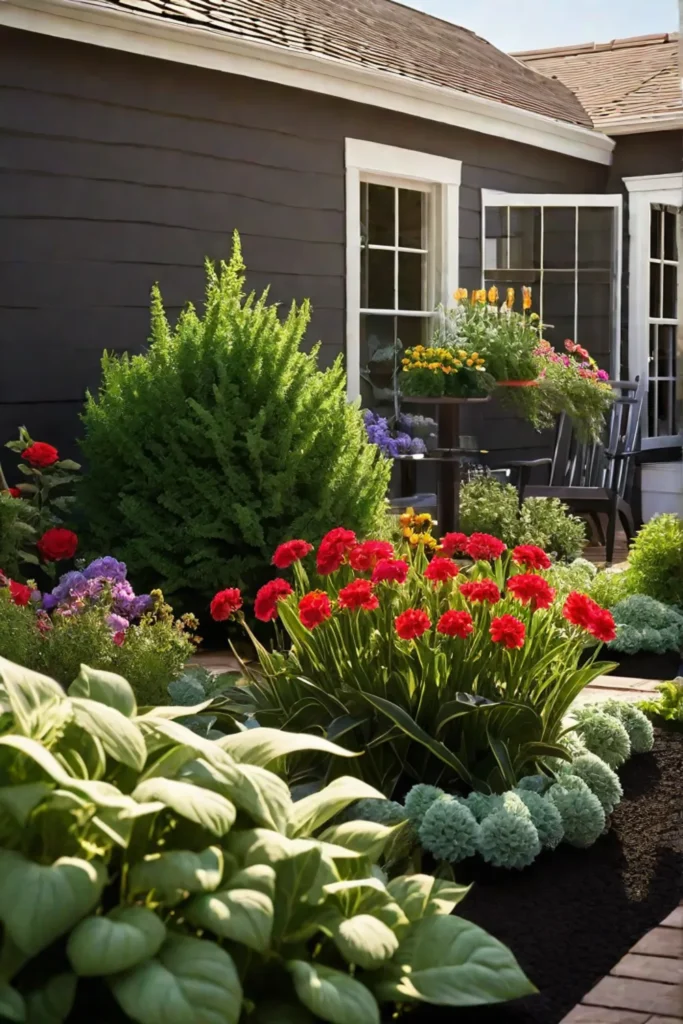
Understanding Your Options: Annuals vs. Perennials
Have you ever stood in the garden center, overwhelmed by the dazzling array of flowers, unsure which ones to choose? Don’t worry; I’ve got your back! Let’s dive into the world of annuals and perennials, unlocking the secrets to creating a backyard paradise that will leave your neighbors green with envy.
Benefits of Annuals
Annuals are the rock stars of the garden world, bursting onto the scene with a vibrant explosion of color and personality. These showstoppers complete their life cycle in a single season, putting on a spectacular performance before making way for next year’s lineup. Imagine a constantly evolving canvas of blooms, allowing you to experiment with new color combinations and designs each year. Plus, some annuals, like the ever-cheerful marigold, have a bonus – they can help deter pesky garden pests, making them the ultimate multi-taskers.
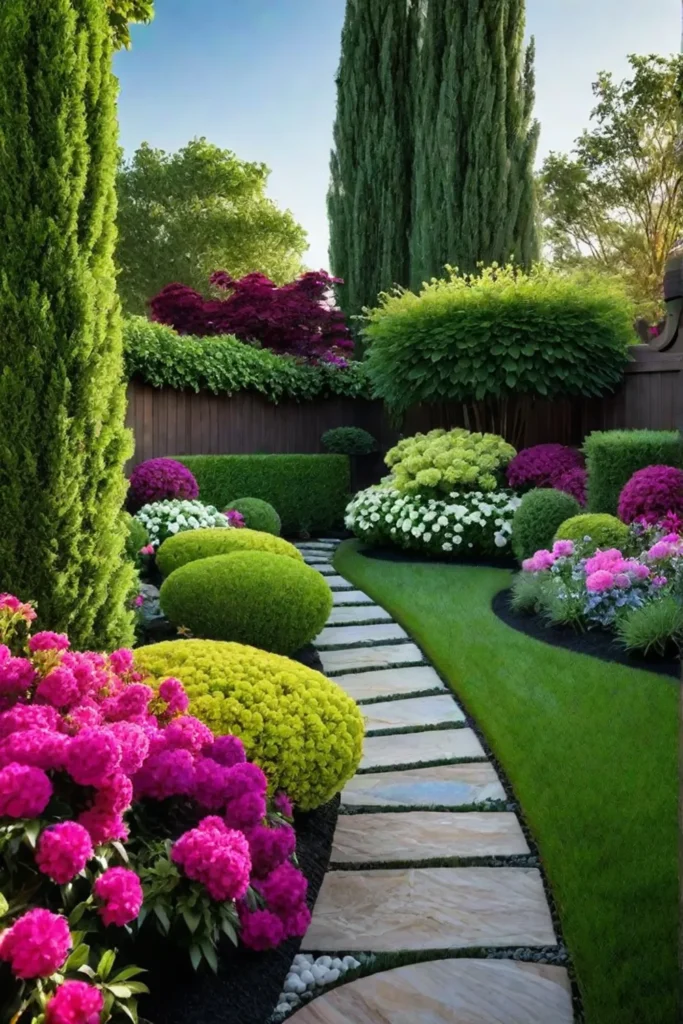
Benefits of Perennials
Perennials, on the other hand, are the reliable workhorses of the garden, returning year after year with their steadfast beauty and resilience. These hardy plants provide a solid foundation for your landscape, offering structure and year-round interest. Imagine waking up each spring to the familiar faces of your beloved perennials, like the graceful coneflower, beckoning butterflies to join the party. With perennials, you can sit back and enjoy the show without the constant need for replanting.
Practical Tips
When it comes to incorporating annuals and perennials into your backyard, the possibilities are endless. Use annuals to fill in gaps in your garden beds or create vibrant container displays that can be easily swapped out with each season. For perennials, think of them as the backbone of your garden, providing a consistent framework around which you can weave your annual accents.
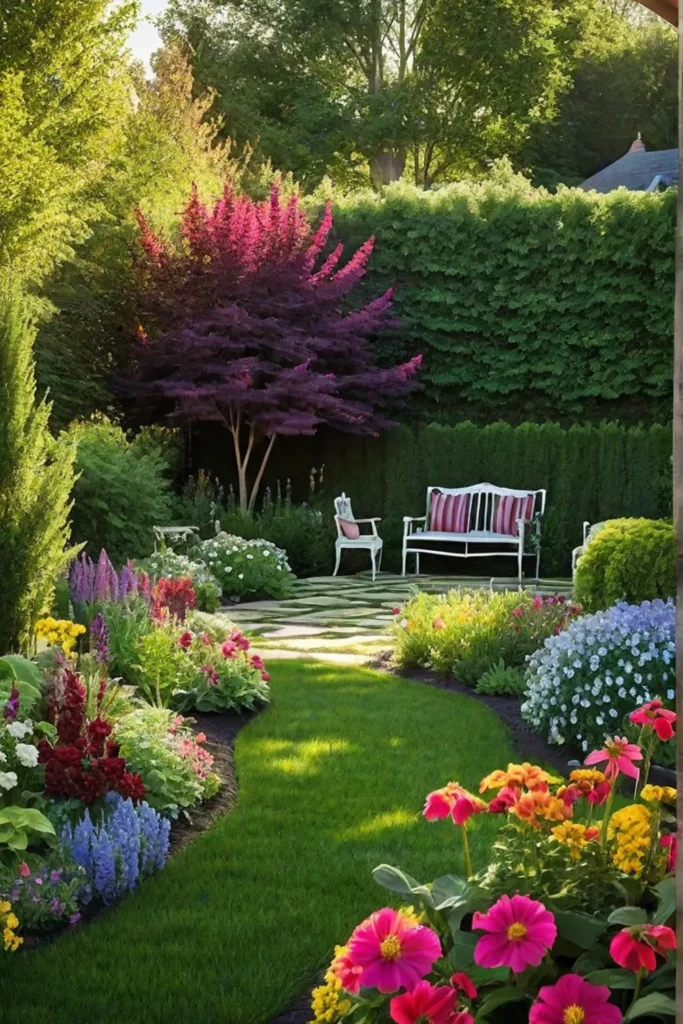
So, what are you waiting for? Embrace the diversity of annuals and perennials, and let your creativity run wild! Remember, I’m just a phone call or email away if you need personalized recommendations for your region or specific growing conditions.
Embracing nature’s beauty doesn’t stop at annuals and perennials – there’s a whole world of native plants and pollinator-friendly options waiting to be explored. Stay tuned for our next section to dive into supporting local ecosystems and attracting those all-important pollinators to your backyard oasis.
Embracing Nature’s Beauty: Native Plants and Pollinator-Friendly Options
Have you ever wondered why certain flowers attract more butterflies and bees than others? The secret lies in choosing pollinator-friendly plants native to your region. As a gardening enthusiast, I’m here to guide you through the enchanting world of embracing nature’s beauty in your backyard.
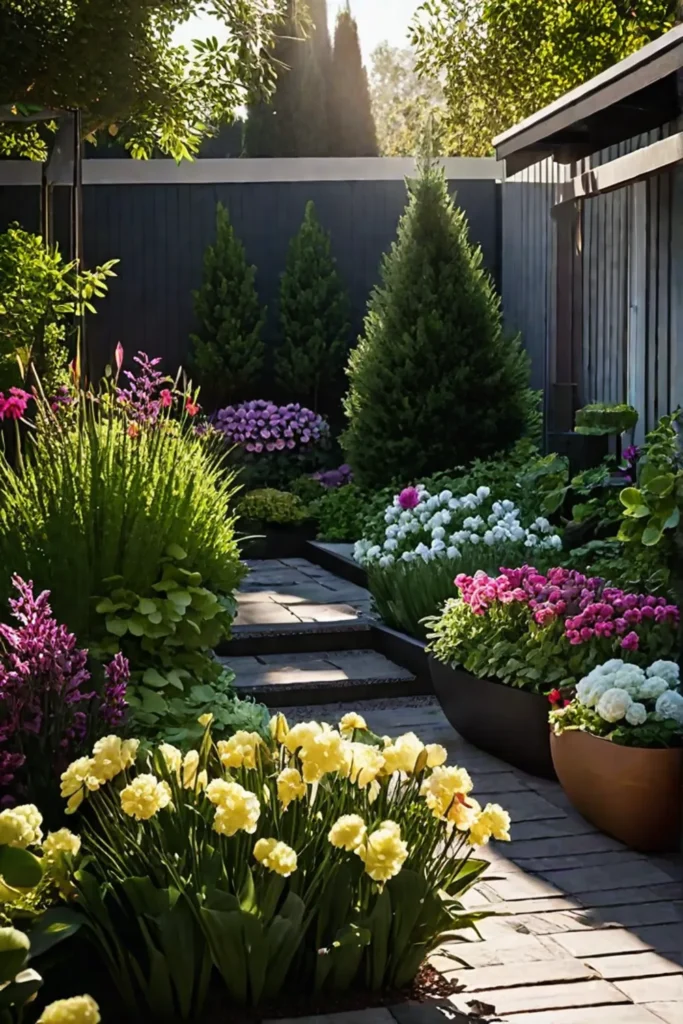
Benefits of Native Plants
Native plants are nature’s gift to your garden, perfectly adapted to thrive in your local ecosystem. They require less water and maintenance, and their deep root systems help prevent soil erosion. These hardy beauties are true survivors, resilient to local climate conditions and resistant to pests and diseases. By choosing native plants, you create a sustainable and low-maintenance oasis that celebrates your region’s natural heritage.
Importance of Pollinators
Pollinators, such as bees, butterflies, and hummingbirds, play a crucial role in our ecosystem. Did you know that these fascinating creatures make one out of every three bites of food we eat possible? Without them, many plants would struggle to reproduce, leading to a decline in biodiversity and food production. By incorporating pollinator-friendly plants into your backyard, you’re creating a vibrant and colorful landscape, supporting these vital pollinators, and ensuring a healthy ecosystem.
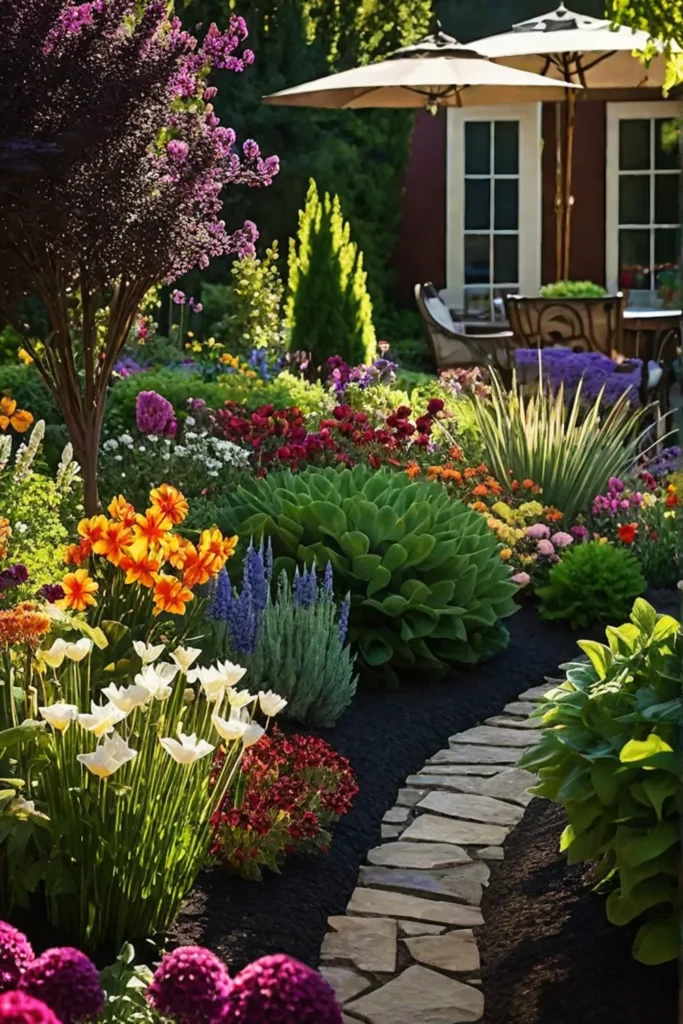
Creating a Pollinator Paradise
To attract a diverse array of pollinators, consider creating a pollinator garden with various flowering plants that bloom at different times of the year. This will give your winged visitors a continuous source of nectar and pollen. Research native plant societies in your area to discover suitable options for your backyard’s sunlight and soil conditions. Some popular pollinator-friendly plants in many regions include bee balm, coneflowers, milkweed, and sunflowers.
By embracing native plants and pollinator-friendly options, you’ll create a stunning backyard oasis and contribute to a healthier, more sustainable environment. So, let’s get our hands dirty and start planting!
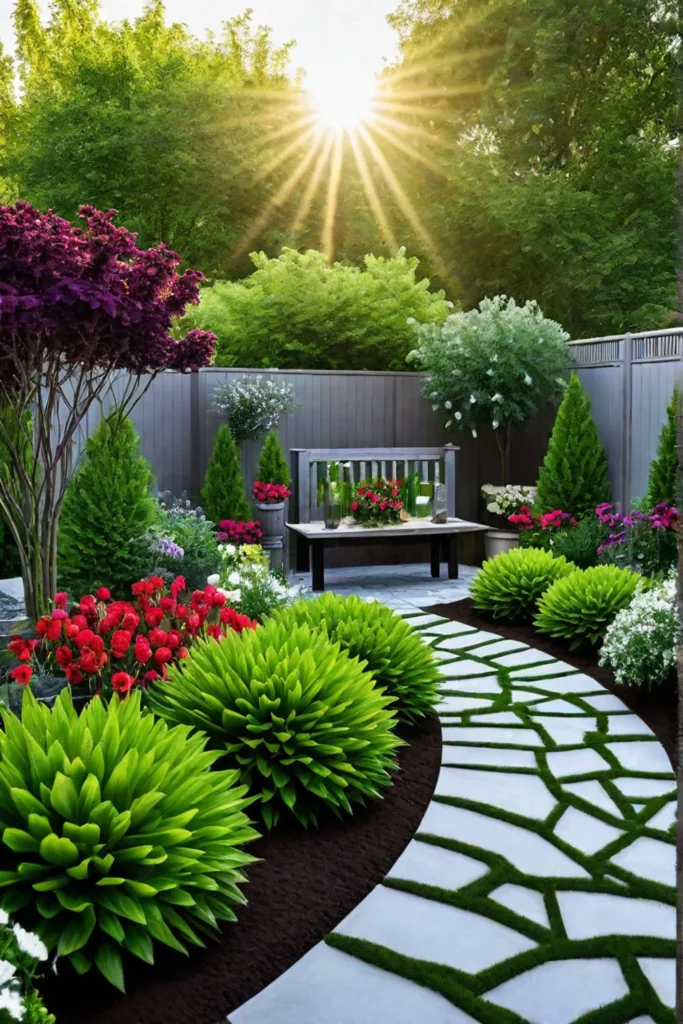
Imagine the joy of watching butterflies dance from flower to flower or witnessing the industrious buzz of bees as they pollinate your garden. The next section, “Adding Structure and Elegance: Flowering Shrubs,” will guide you in incorporating these versatile plants into your backyard design, adding depth and year-round interest.
Adding Structure and Elegance: Flowering Shrubs
Have you ever admired those breathtaking backyard landscapes with stunning bursts of color and height? That’s the magic of flowering shrubs! As a gardening enthusiast, I can’t help but gush over the elegance and structure these beauties bring to any outdoor space.
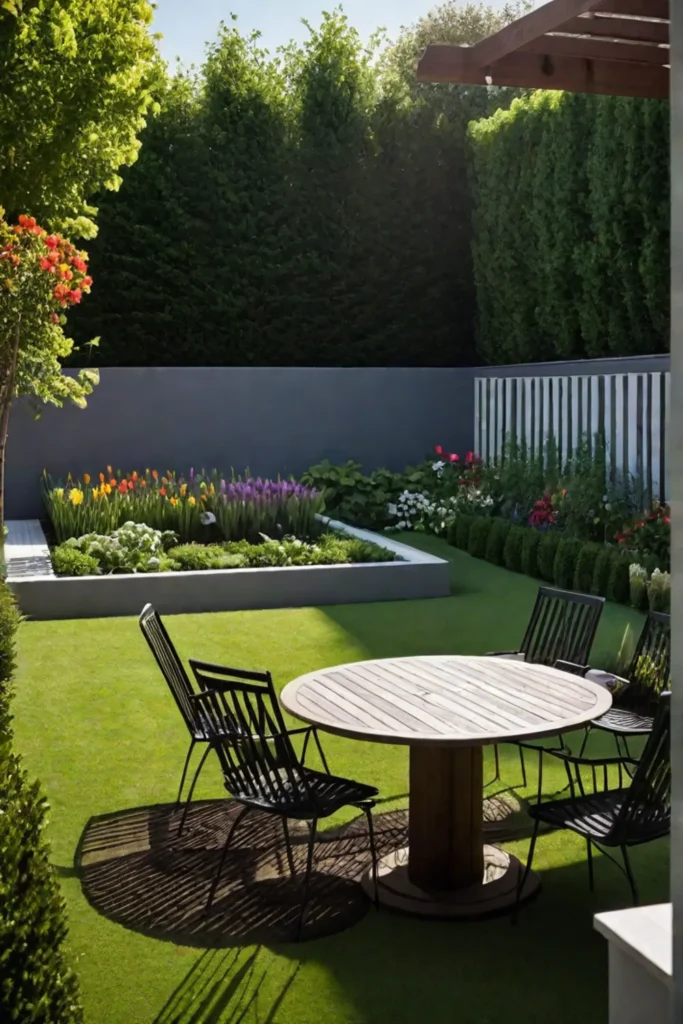
Choosing the Right Shrub
With so many options out there, selecting the perfect flowering shrub can feel like a daunting task. But fear not my fellow green thumbs! Consider the size and shape that best suits your backyard’s layout. Compact shrubs like azaleas or spireas can add vibrant pops of color to smaller spaces, while larger varieties like hydrangeas or lilacs create stunning focal points in more expansive areas.
Care and Maintenance
Proper care is key to ensuring your flowering shrubs thrive and put on a spectacular show year after year. Pruning is essential, but the technique varies depending on the shrub type. Some bloom on old wood, while others produce flowers on new growth. Research your specific shrubs’ needs and prune accordingly to promote healthy growth and abundant blooms.
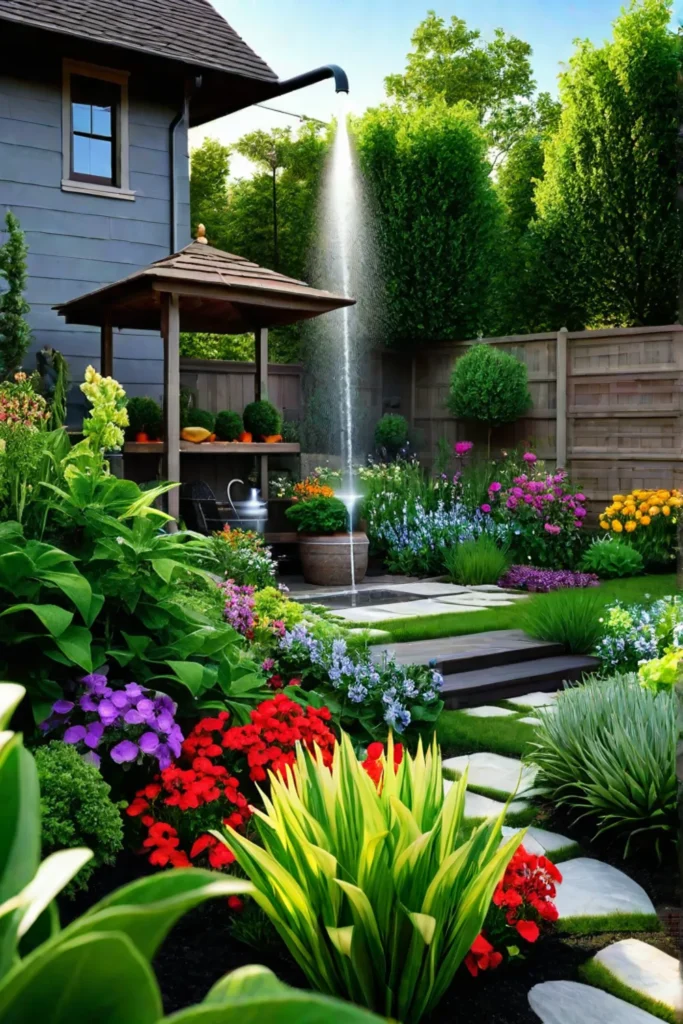
Interesting Facts and Practical Tips
Did you know that some flowering shrubs, like the beloved hydrangea, can change their bloom color based on the soil’s pH level? It’s a fascinating chameleon act that adds an extra touch of magic to your garden! And let’s not forget the beneficial insects and birds these shrubs attract, creating a harmonious ecosystem in your backyard.
Use flowering shrubs as hedges, borders, or focal points in your landscape design. Mix and match different varieties for a stunning, ever-changing display throughout the seasons. With proper care and placement, these structural beauties will elevate your backyard to new heights of elegance and charm.
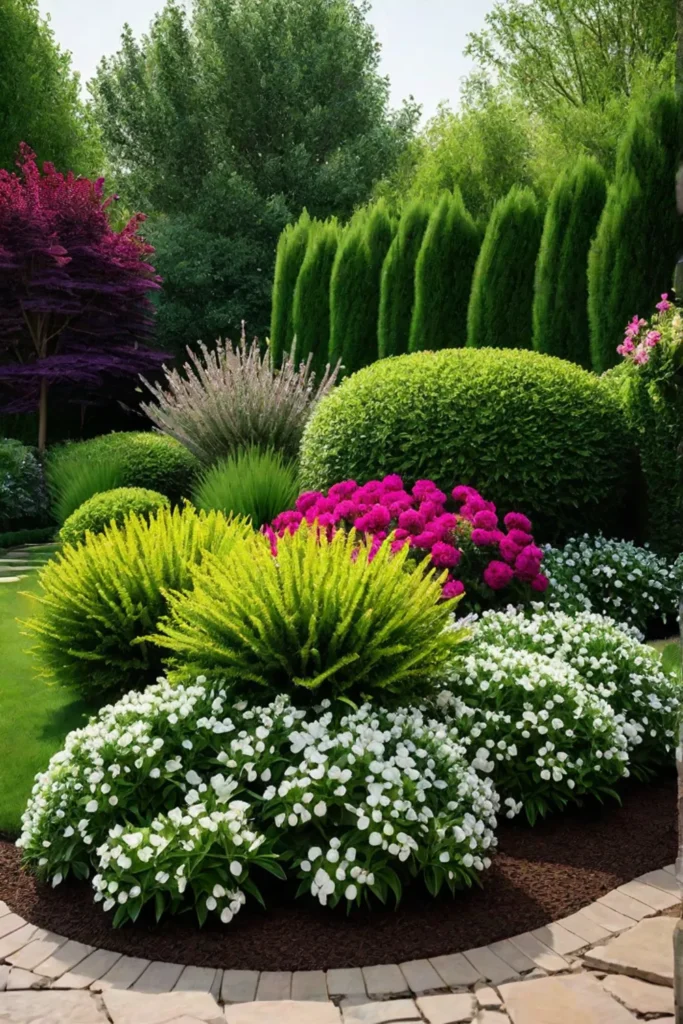
Speaking of charm, have you ever wondered how to select the perfect flowers to complement your stunning flowering shrubs? That’s our next stop on this blooming adventure!
Selecting the Perfect Flowers: Factors to Consider
Have you ever stood in the garden center, overwhelmed by the kaleidoscope of colors and fragrances, unsure which flowers to choose? Fear not, my friends! As an expert in backyard bliss, I’m here to guide you through selecting the perfect blooms for your outdoor oasis.
Sunlight and Shade
Sunlight is the lifeblood of flowers, and understanding your backyard’s sun exposure is crucial. Some flowers, like the cheerful sunflowers, bask in the glory of full sun, while others, like the delicate impatiens, prefer the cool embrace of shade. Stroll around your backyard throughout the day, observing the areas that receive direct sunlight and those that remain cloaked in dappled shadows.
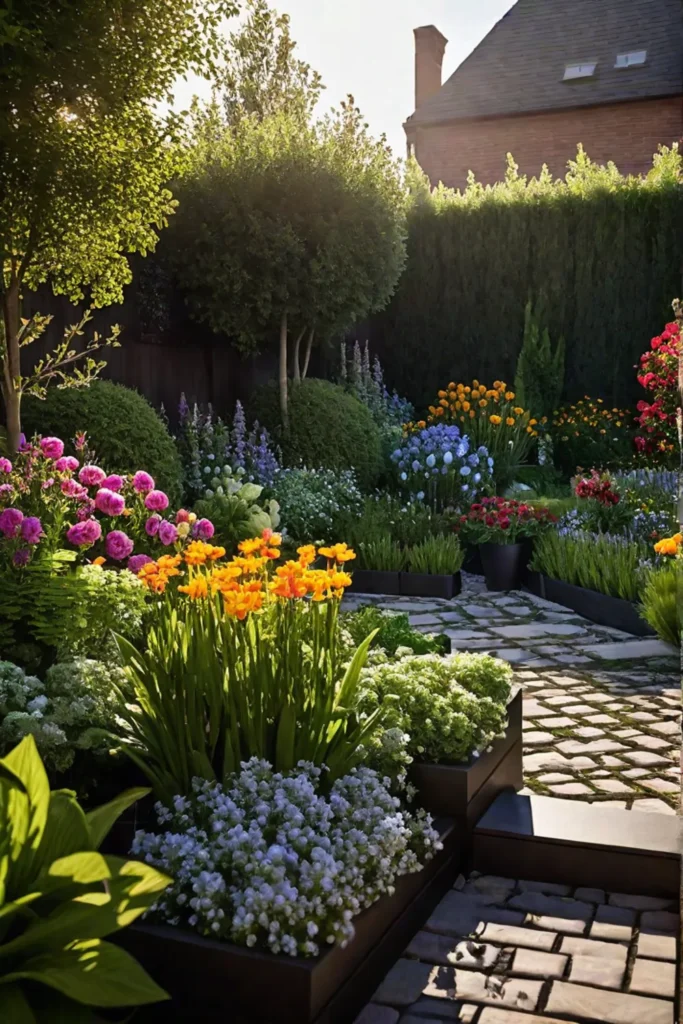
Soil Types and Drainage
Just as humans thrive in different environments, flowers have their preferences regarding soil. Some flourish in rich, loamy soil, while others prefer a more sandy or clay-based medium. However, not just the soil type matters; drainage is also a key factor. Soggy soil can lead to root rot, while overly dry conditions can cause your blooms to wilt. Test your soil’s pH level and nutrient content to ensure you provide the perfect foundation for your floral friends.
Climate and Hardiness Zones
Imagine planting a tropical beauty only to succumb to the first frost. Heartbreaking, right? That’s why understanding your climate and hardiness zone is crucial. These zones, determined by the USDA, indicate the minimum temperature a plant can tolerate. By choosing hardy flowers in your specific zone, you’ll ensure their survival through the changing seasons.
As you embark on your floral journey, match your flower selections to your backyard’s environmental conditions. Choose blooms that will thrive in your specific climate and soil, and you’ll be rewarded with a backyard oasis that will leave you breathless with its beauty.
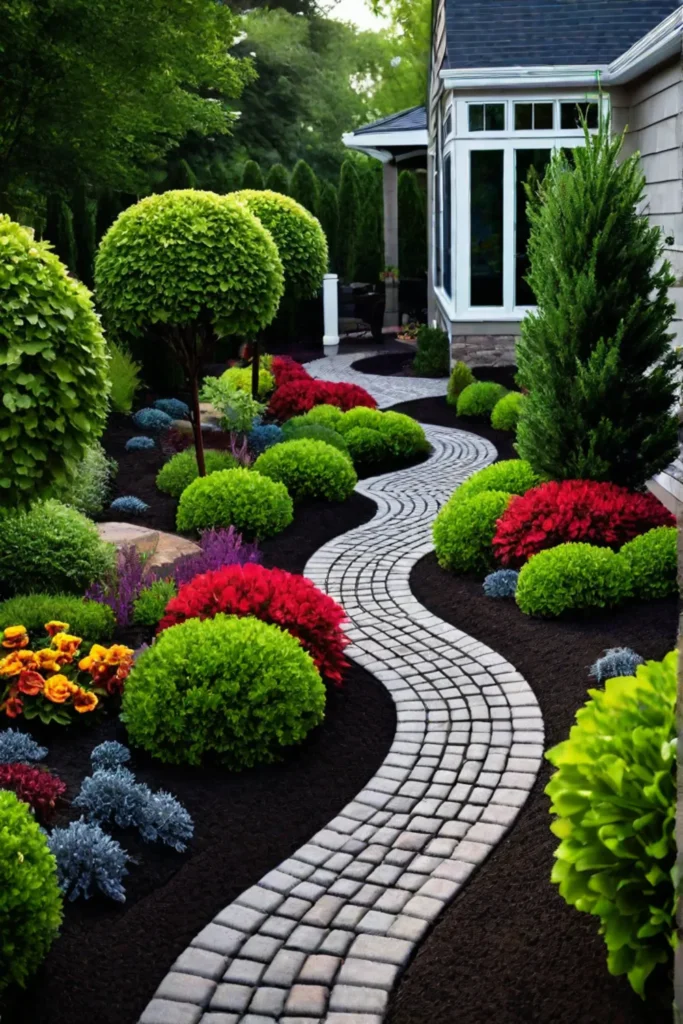
But wait, there’s more! Once you’ve selected your perfect blooms, it’s time to learn the secrets of planting and caring for them. Join me in the next section, where we’ll delve into the tips and tricks for ensuring your flowers flourish, and your backyard becomes the envy of the neighborhood!
Planting and Caring for Your Flowers: Tips for Success
As a passionate gardener, I know that planting and caring for flowers is a labor of love—but it’s also a science! Proper techniques and diligent maintenance are essential for creating a backyard oasis bursting with vibrant blooms.
Planting Techniques
The journey to a flourishing flower garden begins with proper planting. Follow the spacing guidelines on plant labels to give your flowers room to breathe and thrive. Planting at the correct depth is also crucial – too shallow, and the roots may dry out; too deep, and the plant can suffocate. With a little care and attention during planting, you’ll set your flowers up for success.
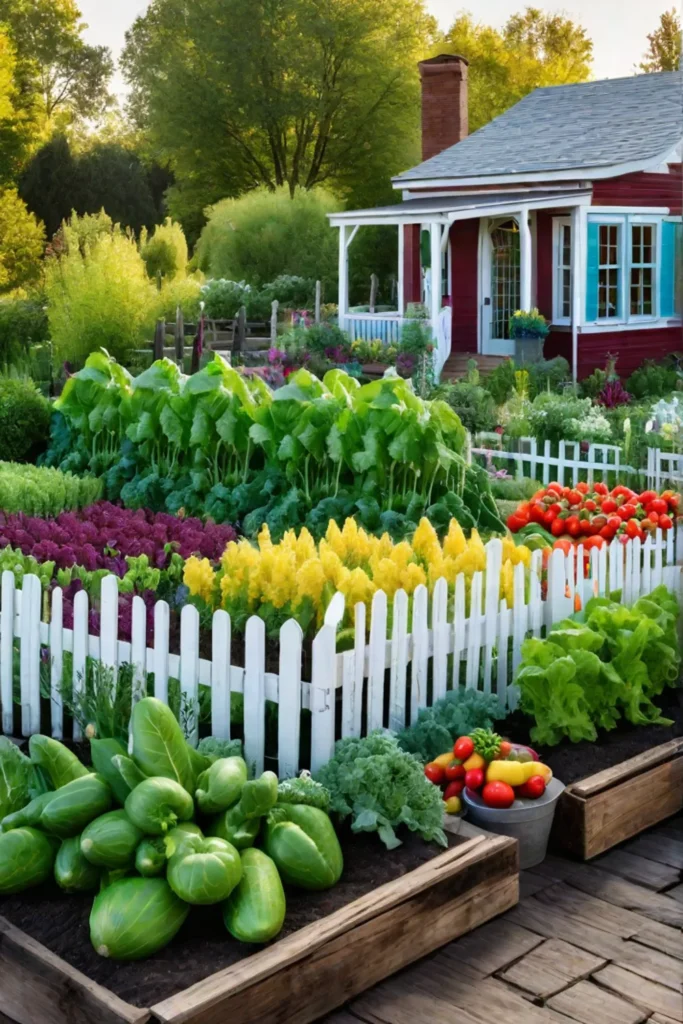
Watering and Fertilizing
Just like us, flowers need proper nourishment to stay healthy and happy. Different varieties have varying water and fertilizer requirements, so research your specific plants. As a general rule, water deeply and less frequently to encourage strong root growth. And don’t forget to feed your flowers with a high-quality fertilizer to provide the nutrients they need to bloom brilliantly.
Pest and Disease Management
Pests and diseases can quickly turn your garden into a wilted mess, but don’t worry – plenty of organic solutions keep your flowers protected. Regularly inspect your plants for signs of trouble, and take action promptly. Beneficial insects like ladybugs and lacewings can be your best friends in the fight against harmful pests, while proper pruning and sanitation can help prevent the spread of diseases.
With a little love and attention, your backyard will be a blooming paradise in no time! But don’t just take my word for it – get out there and start planting. Your flowers (and your neighbors) will thank you.
What’s the secret to keeping your flowers looking their best? Proper care and maintenance, of course! But don’t let that intimidate you – with a little knowledge and effort, you’ll be a pro in no time.
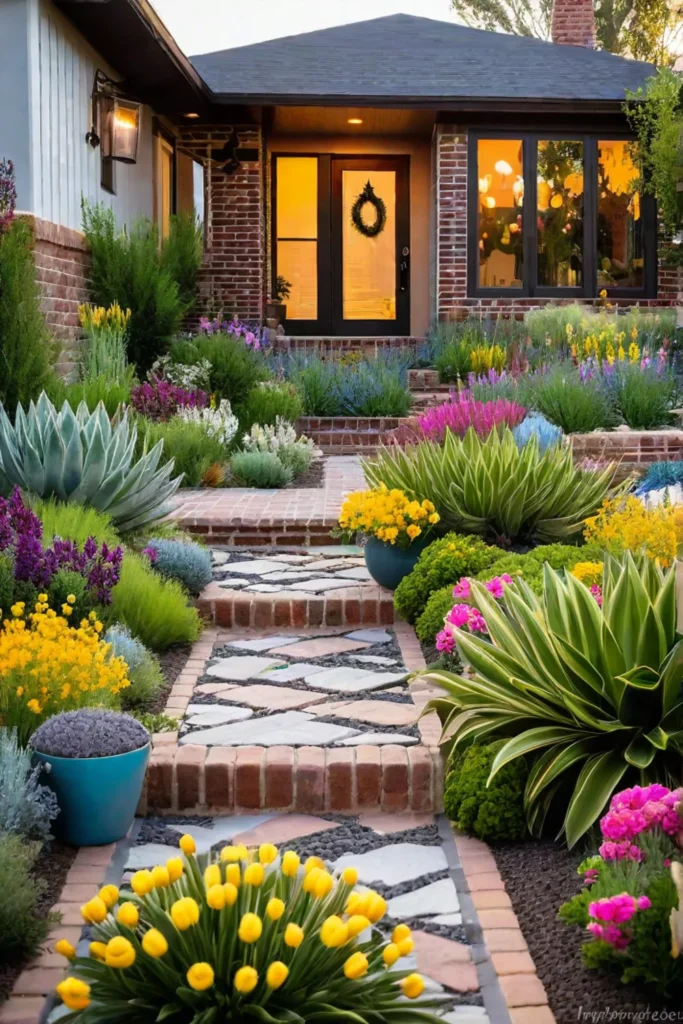
Wrapping Up
As you embark on this floral adventure, remember that the true beauty of gardening lies not just in the result but in the journey itself. Embrace the trial and error, the unexpected delights, and the moments of pure bliss from nurturing life in your backyard.
With patience, dedication, and a willingness to learn, you’ll soon find yourself surrounded by a kaleidoscope of colors, fragrances, and the gentle hum of pollinators – a living, breathing testament to the magic of nature. So, roll up your sleeves, grab your gardening gloves, and let’s get planting!
